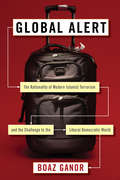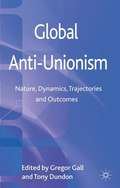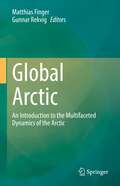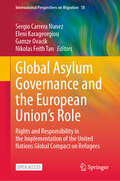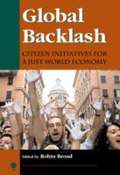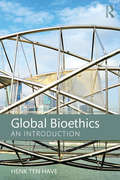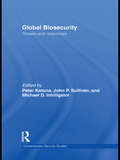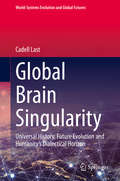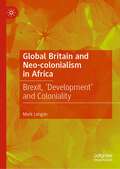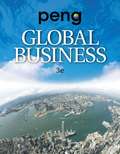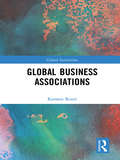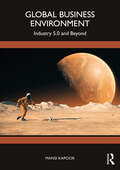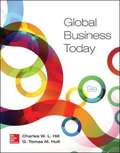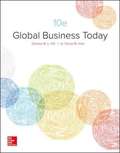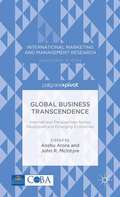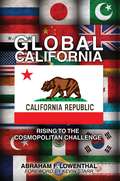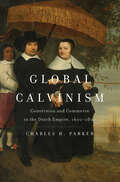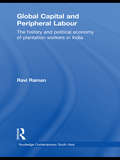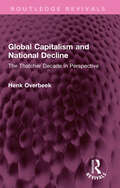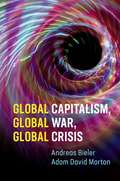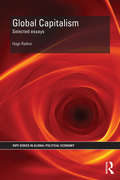- Table View
- List View
Global Alert
by Boaz GanorGlobal Alert describes the motivations that lead to modern Islamist terrorism and the different stages in the execution of a terrorist attack. Challenging the certainty that liberal democratic values offer an antidote to radicalism, the book exposes the exploitation of democratic institutions by terrorists to further their goals and confronts the difficulty democracies face in fighting terrorism, especially when international humanitarian law does not account for nonstate actors in armed conflict. Global Alert especially focuses on the "hybrid terrorist organization" model, which calls for a new international doctrine to neutralize its threat.
Global Alert: The Rationality of Modern Islamist Terrorism and the Challenge to the Liberal Democratic World (Columbia Studies in Terrorism and Irregular Warfare)
by Boaz GanorMany associate terrorism with irrational behavior and believe only lunatics could perpetuate such horrific acts. Global Alert debunks this myth by anatomizing the rationale behind modern terrorism. It draws a distinct picture of its root and instrumental causes and plots the different stages of a terrorist attack, from indoctrination and recruitment to planning, preparation, and launch.Global Alert also exposes the measured exploitation of democratic institutions by terrorists to further their goals. Despite its strong capabilities and extensive resources, the modern liberal-democratic state is nevertheless subject to the rules of war, which partially restrict the state's ability to operate and maneuver. Boaz Ganor shows how terrorist organizations exploit these values to paralyze or neutralize the states they oppose. In outlining this new "hybrid" terrorist organization and its activity in both the military–terrorist arena and the political–welfare arena, Ganor advances an international doctrine for governing military operations between state and nonstate actors as part of a new type of armed conflict termed "multidimensional warfare."
Global Anti-Unionism
by Gregor Gall Tony DundonOne of the major obstacles unions face in building influence in the workplace is the opposition and resistance from those that own those workplaces, namely, the employers. This volume examines the nature of this anti-unionism, and in doing so explains the ways and means by which employers have successfully maintained their right to manage.
Global Appetites: American Power and the Literature of Food
by Allison CarruthGlobal Appetites explores how industrial agriculture and countercultural food movements underpin U. S. conceptions of global power in the century since the First World War. Allison Carruth's study centers on what she terms the "literature of food" - a body of work that comprises literary realism, late modernism, and magical realism along with culinary writing, food memoir, and advertising. Through analysis of American texts ranging from Willa Cather's novel O Pioneers! (1913) to Novella Carpenter's nonfiction work Farm City (2009), Carruth argues that stories about how the United States cultivates, distributes, and consumes food imbue it with the power to transform social and ecological systems around the world. Lively and accessible, this interdisciplinary study will appeal to scholars of American literature and culture as well as those working in the fields of food studies, food policy, agriculture history, social justice, and the environmental humanities.
Global Arctic: An Introduction to the Multifaceted Dynamics of the Arctic
by Matthias Finger Gunnar RekvigThe Arctic has become a global arena. This development can only be comprehensively understood from a transdisciplinary perspective encompassing ecological, cultural, societal, economic, industrial, geopolitical, and security considerations. This book offers thorough explanations of Arctic developments and challenges. Global warming is in large part the driving force behind the transformation of the Arctic by making access possible to the areas previously out of reach for mining and shipping. An all-year ice-free Arctic Ocean, a reality possible as soon as perhaps 2030, creates a new dynamic in the North. The retreating ice edge enables the exploitation of previously inaccessible resources such as hydrocarbon deposits and rare metals, as well as the shortest sea route from Asia to Europe. Consequently, the Northern Sea Route (NSR) promises faster and cheaper shipping. Russia, along side foreign investment, especially from China, is financing the needed infrastructure. A warming Arctic, however, also has negative impacts. The Arctic is home to fragile ecosystems that are already showing signs of deteriorating. The Arctic has seen unprecedented wildfires, which, together with the release of trapped methane from the disappearing permafrost, will, in turn, accelerate global warming. A warmer Arctic Ocean will also negatively impact fisheries. Couple this with other global changes, such as ocean acidification and modified ocean currents, and the global outlook is bleak. Additionally, the security situation in the Arctic is worsening. After the 2014 Ukraine crisis, the West imposed sanctions on the Russian Federation, which have revived the divisions of the Cold War. The reemergence of these postures is threatening the highly successful Barents Cooperation and other initiatives for peace in the circumpolar North. This book offers new insights and presents arguments for how to mitigate the challenges the Arctic is facing today.
Global Asylum Governance and the European Union's Role: Rights and Responsibility in the Implementation of the United Nations Global Compact on Refugees (International Perspectives on Migration #18)
by Eleni Karageorgiou Sergio Carrera Nunez Gamze Ovacik Nikolas Feith TanThis open access book provides a state-of-the-field of the interactions between emerging national asylum governance systems and the 2018 United Nations Global Compact for Refugees (UN GCR). It provides a detailed examination of the relationship and compatibility between asylum governance and refugee protection and human rights, and the responsibilities for states and other implementing actors in cases of human rights violations. This book analyses the characteristics and impacts of existing and emerging asylum governance instruments and their practical implementation in selected countries hosting large communities of refugees around the world. Particular focus is given to the cases of Bangladesh, Brazil, Canada, Jordan, Niger, Serbia, South Africa and Turkey. Attention is put into regional and country-specific asylum instruments and actors from the perspective of their effectiveness, fairness and consistency with refugee protection and human rights standards as well as the UN GCR commitments. By doing so, the book identifies key lessons learned and offers a critical view on policies framed as `promising practices' so as to inform future steps in the UN GCR implementation and asylum governance more generally. As such, the book provides a better understanding of the concept of “mobility” in asylum governance, and the ways in which it is articulated into legal and policy instruments framed as "protection" and - in the language of the UN GCR - “third country solutions” for refugee mobility, including resettlement, private/community sponsorships, humanitarian corridors, in the European Union and around the world.
Global Backlash: Citizen Initiatives for a Just World Economy
by Robin BroadBook aims to get inside the backlash to some of its visions, proposals, and debates. Introduces readers to different parts of the movement by presenting what they are trying to do to change the way the world economy works.
Global Bioethics: An introduction (Advancing Global Bioethics Ser. #10)
by Henk ten HaveThe panorama of bioethical problems is different today. Patients travel to Thailand for fast surgery; commercial surrogate mothers in India deliver babies to parents in rich countries; organs, body parts and tissues are trafficked from East to Western Europe; physicians and nurses migrating from Africa to the U.S; thousands of children or patients with malaria, tuberculosis and AIDS are dying each day because they cannot afford effective drugs that are too expensive. Mainstream bioethics as it has developed during the last 50 years in Western countries is evolving into a broader approach that is relevant for people across the world and is focused on new global problems. This book provides an introduction into the new field of global bioethics. Addressing these problems requires a broader vision of bioethics that not only goes beyond the current emphasis on individual autonomy, but that criticizes the social, economic and political context that is producing the problems at global level. This book argues that global bioethics is a necessity because the social, economic and environmental effects of globalization require critical responses. Global bioethics is not a finished product that can simply be applied to solve global problems, but it is the ongoing result of interaction and exchange between local practices and global discourse. It combines recognition of differences and respect for cultural diversity with convergence towards common perspectives and shared values. The book examines the nature of global problems as well as the type of responses that are needed, in order to exemplify the substance of global bioethics. It discusses the ethical frameworks that are available for global discourse and shows how these are transformed into global governance mechanisms and practices.
Global Biosecurity: Threats and Responses (Contemporary Security Studies)
by Peter KatonaThis book explores a range of biohealth and biosecurity threats, places them in context, and offers responses and solutions from global and local, networked and pyramidal, as well as specialized and interdisciplinary perspectives. Specifically covering bioterrorism, emerging infectious diseases, pandemic disease preparedness and remediation, agroterroism, food safety, and environmental issues, the contributors demonstrate that to counter terrorism of any kind, a global, networked, and multidisciplinary approach is essential. To be successful in biosecurity, this book argues it is necessary to extend partnerships, cooperation, and co-ordination between public health, clinical medicine, private business, law enforcement and other agencies locally, nationally and internationally. Internationally, a clear understanding is needed of what has happened in past epidemics and what was accomplished in past bioprograms (in Britain, South Africa, Russia, for example). This book also assesses how, with the right technology and motivation, both a state and a non-state actor could initiate an extremely credible biothreat to security at both local and national levels. This book will be of much interest to students, researchers and practitioners of security studies, public health, public policy and IR in general. Peter Katona is Associate Professor of Clinical Medicine at the David Geffen School of Medicine at UCLA in Infectious Diseases. He is co-founder of Biological Threat Mitigation, a bioterror consulting firm. John P. Sullivan is a lieutenant with the Los Angeles Sheriff’s Department. He is also a researcher focusing on terrorism, conflict disaster, intelligence studies, and urban operations. He is co-founder of the Los Angeles Terrorism Early Warning (TEW) Group. Michael D. Intriligator is Professor of Economics at the University of California, Los Angeles (UCLA). He is also Professor of Political Science, Professor of Public Policy in the School of Public Policy and Social Research, and Co-Director of the Jacob Marschak Interdisciplinary Colloquium on Mathematics in the Behavioral Sciences, all at UCLA.
Global Brain Singularity: Universal History, Future Evolution and Humanity’s Dialectical Horizon (World-Systems Evolution and Global Futures)
by Cadell LastThis book introduces readers to global brain singularity through a logical meditation on the temporal dynamics of the universal process. Global brain singularity is conceived of as a future metasystem of human civilization that represents a qualitatively higher coherence of order.To better understand the potential of this phenomenon, the book begins with an overview of universal history. The focus then shifts to the structure of human systems, and the notion that contemporary global civilization must mediate the emergence of a commons that will transform the future of politics, economics and psychosocial life in general. In this context the book presents our species as biocultural evolutionary agents attempting to create a novel and independent domain of technocultural evolution that affords us new levels of freedom.Lastly, the book underscores the internal depths of the present moment, structured by a division between subject and object. The nature of the interaction between subject and object would appear to govern the mechanics of a spiritual process that is key to understanding the meaning of singularity inclusive of observers. Given its scope, the book will appeal to readers interested in systems approaches to the emerging world society, especially historians, philosophers and social scientists.
Global Britain and Neo-colonialism in Africa: Brexit, 'Development' and Coloniality
by Mark LanganThis book examines the implications of Brexit for Africa-UK relations amid a ‘new scramble’ for the continent. Engaging Nkrumah on neo-colonialism and recent scholarship on global coloniality, Langan here underscores concerns that Brexit was fuelled by an imperial romanticism that now gives rise to a Global Britain project involving the perpetration of ‘Empire 2.0’ in Africa. In this context, he examines UK elites’ pursuit of Brexit trade deals and the ‘development’ consequences of premature market opening. Throughout its chapters, this work assesses strategic usages of UK aid monies in terms of economic leverage and the externalisation of migration and highlights the impact of UK development finance and corporate activities for the health and wellbeing of workers and host communities. Significantly, Langan explores the UK’s pursuit of security interests and human rights criticisms and concludes by highlighting African agency to resist the Global Britain project amid the fragility of the British state itself.
Global Business 3rd Edition
by Mike W. PengThis edition blends both an institutional-based view and resource-based view throughout every chapter for an unparalleled continuity in the learning process. The book combines an inviting, conversational style with the latest research and examples throughout every chapter. A comprehensive set of cases from Mike Peng and other respected international experts examine how companies throughout the world have expanded globally. All-new video cases, world maps, and unique global debate sections help readers view business challenges from a truly global perspective.
Global Business Associations (Global Institutions)
by Karsten RonitGlobal business tends to be perceived as a number of individual but powerful multinational corporations, capable of controlling markets and influencing political decisions; in fact, global business is highly organized through a plethora of associations that bring together competing companies and conflicting national businesses. Indeed, global business associations have a long history and, with accelerated globalization, further opportunities emerge for unified business action. This book fills a significant gap in the current literature, examining the pivotal role of global business associations and providing a concise and accessible overview of their different functions in a range of institutional contexts. Beginning by clarifying the concept of global business associations, the author puts their role into a historical and contemporary context in which their economic, social and political functions are sketched. Their historical origin is outlined, including the proliferation of global associations in the twentieth and twenty-first centuries. He then moves on to explore and analyse the different types of actors, explaining key categories and their place in the organization of global business with chapters on peak associations (e.g. ICC and WEF), industry associations, alliances, as well as clubs and think tanks, and facilitators. Covering the history, current role and future evolution of this dynamic category of associations, this work will be essential reading for students and scholars of international political economy, international relations, international organizations and global governance.
Global Business Cycles: Convergence or Decoupling?
by Eswar S. Prasad M. Ayhan Kose Christopher OtrokA report from the International Monetary Fund.
Global Business Environment: Industry 5.0 and Beyond
by Mansi KapoorThis book discusses the shifting paradigms in global business environment from the Fourth Industrial Revolution (Industry 4.0) to the Fifth Industrial Revolution (Industry 5.0). It captures the current shifts in the global environment for business caused mainly by the disruptive nature of rapid technological advancements and the consequences of globalisation, which impact political, social and economic changes.Divided into six sections—Political, Economic, Socio-Cultural, Technological, Ethical & Environmental, this book attempts to build perspectives on current trends sweeping globally across political, technological, socio-cultural and economic landscapes. Furnished with up-to-date examples and case studies, it presents an exhaustive yet lucid view of current socio-economic realities, the latest technological advancements, political undercurrents, and the issues and challenges confronting organisations and institutions both globally and locally. It is a compelling narrative based on ongoing years of deep research, cases, theoretical frameworks and insights that can help navigate what seems like an unimaginable future.This book will be useful to students, researchers and teachers of management, economics, liberal arts and related social sciences disciplines. It will also be a useful reference for those studying Public Policy and Law.
Global Business Regulation
by Peter Drahos John Braith WaiteAcross an amazing sweep of the critical areas of business regulation - from contract, intellectual property and corporations law, to trade, telecommunications, labour standards, drugs, food, transport and environment - this book confronts the question of how the regulation of business has shifted from national to global institutions. Based on interviews with 500 international leaders in business and government, this book examines the role played by global institutions such as the WTO, the OECD, IMF, Moody's and the World Bank, as well as various NGOs and significant individuals. The authors argue that effective and decent global regulation depends on the determination of individuals to engage with powerful agendas and decision-making bodies that would otherwise be dominated by concentrated economic interests. This book will become a standard reference for readers in business, law, politics and international relations.
Global Business Today (Ninth Edition)
by Charles W. L. Hill G. Tomas M. HultGlobal Business Today is the proven choice for any international business course. It brings together the insights of now a team of practitioners, scholars, and award-winning instructors to present a contemporary and realistic perspective of this multi-faceted field. For the 9th edition, G. Tomas M. Hult from Michigan State University has joined Charles Hill to deliver a program that is: Current--it is comprehensive and up-to-date. Application Rich--it goes beyond an uncritical presentation and shallow explanation of the body of knowledge. Relevant--it focuses on managerial implications. Integrated--its tight flow between chapters is fully integrated with proven adaptive technology. Global Business Today--The market-leading program of international business.
Global Business Today, 10th Edition
by Charles W. L. Hill G. Tomas M. HultGlobal Business Today (GBT), current, relevant, application rich, and accessible and student focused book covers macro and micro issues equally. It enables students in the international business courses understand the implications of international business for their organization's strategy, structure, and functions in the context of the global marketplace.
Global Business Transcendence: International Perspectives across Developed and Emerging Economies
by John R. Mcintyre Anshu Saxena AroraGlobal Business Transcendence argues that country's borders are becoming less important from a trade perspective. We are thus quickly approaching a single global economy.
Global California: Rising to the Cosmopolitan Challenge
by Abraham F. LowenthalCalifornia is at the cutting edge of technological change, demographic transformation, and international engagement. It has the country's largest population, and is its biggest producer of agricultural and manufactured goods, its main exporter and importer, and a leading center for higher education, research, the media, and philanthropy. Its population is the most international; more than a quarter of the state's residents were born in another country. But habits of thought and structures date from the mid-twentieth century, when California was turned inward. California today lacks ideas, institutions, and policies commensurate with its global stakes and clout. Global California addresses an important subject: how the citizens of a state with the dimensions and power of a nation are affected by international trends, and what they can do to identify and promote their own interests in a rapidly changing world. In this fresh, well-informed, and balanced analysis, Abraham Lowenthal deals with numerous thorny issues—from globalization, trade, and infrastructure to immigration, environmental pollution, climate change, and California's ties with neighboring Mexico and the dynamic Asian economies. A recognized authority on foreign affairs, Lowenthal argues that the real choices are not whether to cheer globalization or condemn it. Rather, Californians need to think strategically and act effectively to gain as much as possible from international engagement while managing its risks and costs. They need to build "cosmopolitan capacity" to understand and respond to global challenges and opportunities. Too much is at stake for California—its citizens, government, firms and non-governmental organizations—to leave thinking and acting on international affairs to the federal government and to East Coast think tank experts. This volume shows Californians how to succeed in an ever more interconnected world.
Global Calvinism: Conversion and Commerce in the Dutch Empire, 1600-1800
by Charles H. ParkerA comprehensive study of the connection between Calvinist missions and Dutch imperial expansion during the early modern period &“A tour de force offering the reader the best study of global Calvinism in the realms of the Dutch East India Company.&”—Ronnie Po-Chia Hsia, editor, Calvinism and Religious Toleration in the Dutch Golden Age Calvinism went global in the seventeenth and eighteenth centuries, as close to a thousand Dutch Reformed ministers, along with hundreds of lay chaplains, attached themselves to the Dutch East India and West India companies. Across Asia, Africa, and the Americas where the trading companies set up operation, Dutch ministers sought to convert &“pagans,&” &“Moors,&” Jews, and Catholics and to spread the cultural influence of Protestant Christianity. As Dutch ministers labored under the auspices of the trading companies, the missionary project coalesced, sometimes grudgingly but often readily, with empire building and mercantile capitalism. Simultaneously, Calvinism became entangled with societies around the world as encounters with indigenous societies shaped the development of European religious and intellectual history. Though historians have traditionally treated the Protestant and European expansion as unrelated developments, the global reach of Dutch Calvinism offers a unique opportunity to understand the intermingling of a Protestant faith, commerce, and empire.
Global Capital and Peripheral Labour: The History and Political Economy of Plantation Workers in India (Routledge Contemporary South Asia Series)
by Ravi RamanThis book presents a historical account of plantations in India in the context of the modern world economy. It brings history up to the present, thereby showing how history can assist in explaining contemporary conditions and trends. The author focuses on labour and economic development problems and uses the World Systems theory so as to demonstrate the practical utility of the theory and its limitations as a guide to historical research. Based on extensive archival research, the book interprets the dynamics of plantation capitalism by focusing on the work, life and struggle of the dalits on plantations in colonial and post-colonial South India as they evolved from the mid-19th century. It argues that these elements of the plantation life-world were fashioned by the specific characteristics of the workers' location within the capitalist world-economy, the then prevailing local social structure and the scheme of disciplining to which the workers were subjected to. Treating the relations among various social forces – the planting communities, the oppressed communities (dalits in India), the regional and national state, and the Imperial regime, this book fills a gap in academic literature on capitalism, economic development, and globalization.
Global Capitalism and National Decline: The Thatcher Decade in Perspective (Routledge Revivals)
by Henk OverbeekFirst published in 1990, Global Capitalism and National Decline is a major contribution to the study of British political and economic decline. The author concentrates on the global nature of capitalism as the context for the development of national capitalism, and on the relationship between internal and external factors. A long-term view of British politics enables him to demonstrate that competing popular explanations of Britain’s crisis and the rise of Thatcherism in response to it, are in fact interconnected. The long decline of Britain originating in the 19th century, the inherent weakness of the post-1945 settlement, and the critical events of 1970s, acquire their fullest meaning when seen as different ‘layers’ of one and the same historical process. Henk Overbeek takes the story of Britain’s decline through to Margaret Thatcher’s tenth anniversary in office. His book will be invaluable to scholars and students of economics, politics, and history. it offers a clear perspective on the problems of national decline within a global context, and on Britain’s position in Europe and in the wider world.
Global Capitalism, Global War, Global Crisis
by Andreas Bieler Adam David MortonThis book assesses the forces of social struggle shaping the past and present of the global political economy from the perspective of historical materialism. <P><P>Based on the philosophy of internal relations, the character of capital is understood in such a way that the ties between the relations of production, state-civil society, and conditions of class struggle can be realised. Conceiving the internal relationship of global capitalism, global war, global crisis as a struggle-driven process is a major contribution of the book providing a novel intervention on debates within theories of 'the international'. <P>Through a set of conceptual reflections, on agency and structure and the role of discourses embedded in the economy, class struggle is established as our point of departure. This involves analysing historical and contemporary themes on the expansion of capitalism through uneven and combined development (global capitalism), the role of the state and geopolitics (global war), and conditions of exploitation and resistance (global crisis). The conceptual reflections and thematic considerations raised earlier in the book are then extended in a series of empirical interventions. These include a focus on the 'rising powers' of the BRICS (global capitalism), conditions of the 'new imperialism' (global war), and the financial crisis since the 2007–8 Great Recession (global crisis). <P>As a result of honing in on the internal relations of global capitalism, global war, global crisis the final major contribution of the book is to deliver a radically open-ended dialectical consideration of ruptures of resistance within the global political economy.<P> Provides the definitive account of the internal relations of global capitalism, global war, global crisis shaping contemporary world order.<P> Makes a major intervention in debates across the social sciences from a historical materialist perspective.<P> Delivers key insights on the expansion of capitalism through uneven and combined development (global capitalism), the role of the state and geopolitics (global war), and conditions of exploitation and resistance (global crisis).
Global Capitalism: Selected Essays (RIPE Series in Global Political Economy)
by Hugo RadiceThe essays in this volume were published across the 1984-2011 period, and range across a variety of topics and approaches to investigate the changing nature of global capitalism as a social order. As such, they are a valuable and instructive account of the evolution of global capitalism and of the debates which sought to make sense of this; moreover, they enable us to understand more clearly how capitalism may change and evolve in the coming years and decades. The introduction provides a brief historical account of how global capitalism has changed since the 1960s, before summarising each of the essays, situating them more immediately in the context in which they were written. After sketching the evolution of his views over the period, the author concludes by discussing some important dimensions of global capitalism that need further study. The twelve essays are presented in four sections, dealing with the overarching theme of globalisation; the case of Britain; the developing regions of the global South and the former Soviet bloc; and the crisis that has gripped global capitalism since 2008. Presenting an interdisciplinary approach that corresponds with the emergence of international political economy as a distinct field of scholarship, this book will prove to be an invaluable resource for students and scholars of international political economy, politics, economics, international relations, development studies, human geography, critical sociology and business studies.
